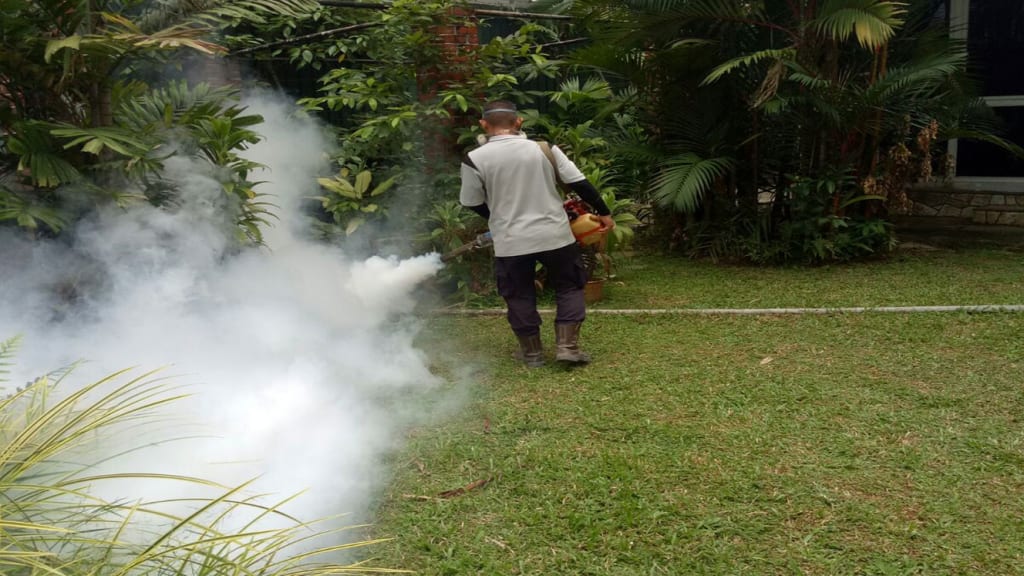How to Control Mosquito Fogging in Singapore?
Mosquito Prevention Singapore

Usually, people are tired from mosquito in their home. There are many mosquito are creating disturbance in your homes, building and offices. Singapore is known for its hot and humid weather, which creates ideal breeding conditions for mosquitoes. Mosquitoes are not only annoying, but they can also carry diseases like dengue, chikungunya, and Zika. To combat mosquito populations, you can uses a range of control measures, including mosquito fogging in singapore.
What is Mosquito Fogging?
Mosquito fogging is a method of controlling mosquito populations by spraying a fine mist of insecticide over a designated area. The mist is created using a special machine called a fogger, which uses a heat source to vaporize the insecticide. The fogging machine is typically mounted on a vehicle and driven through the streets of an affected area, releasing the insecticide as it goes. The insecticide settles on surfaces and kills mosquitoes on contact, as well as preventing mosquito larvae from developing. We offer one of the best fogging machine which is easily usable and help you make clean your home from mosquitos.
Is Mosquito Fogging Effective?
Mosquito fogging is considered an effective control measure for reducing mosquito populations in a specific area. The insecticide used in fogging kills adult mosquitoes and also prevents the development of mosquito larvae. However, the effectiveness of fogging can be limited by a number of factors. First, fogging is most effective when used in conjunction with other mosquito control measures, such as the removal of standing water and the use of insect repellent. Additionally, the effectiveness of fogging can be affected by weather conditions, as rain or wind can disperse the insecticide and reduce its effectiveness. The effectiveness of fogging can be limited by the species of mosquito being targeted. Some species of mosquitoes are more resistant to insecticides than others, which can make fogging less effective.
Is Mosquito Fogging Safe?
While mosquito fogging is effective in reducing mosquito populations, there are concerns about its safety. The insecticide used in fogging can be harmful to humans and animals if not used properly. The most commonly used insecticide in fogging is called pyrethroid, which is a synthetic version of a natural insecticide found in chrysanthemum flowers. Pyrethroid is considered safe for humans and animals when used in low concentrations, but exposure to high concentrations can cause health problems. Symptoms of pyrethroid exposure can include skin irritation, respiratory problems, and nausea. Prolonged exposure to high concentrations of pyrethroid can also cause more serious health problems, such as nerve damage. To minimize the risk of exposure to insecticides during fogging, residents are advised to stay indoors and close all windows and doors during the fogging process. It is also recommended that people with respiratory problems, such as asthma, stay indoors for at least 30 minutes after fogging. Concerns have also been raised about the impact of insecticides on the environment. Insecticides used in fogging can have negative effects on non-target species, such as bees and butterflies, which are important pollinators. Pro Serv care about your concern are offer you this best solution to remove mosquitos from home.
Alternative Mosquito Control Measures
While mosquito fogging is an effective control measure for reducing mosquito populations, there are alternative methods that are safer for humans and the environment. One alternative method is the use of mosquito traps, which attract and capture adult mosquitoes using a combination of light and carbon dioxide. Mosquito traps are considered safe for humans and the environment, and can be used both indoors and outdoors. Another alternative method is the use of larvicides, which are chemicals that target mosquito larvae. Larvicides can be applied to standing water to prevent the development of mosquito larvae, and are considered safe for humans and the environment. Mosquito fogging is an effective control measure for reducing mosquito populations in Singapore, but it is important to use it in conjunction with other control measures and to take precautions to minimize the risk of exposure to insecticides.
Need of Mosquito fogging
Mosquito fogging is typically carried out in areas where there is a high mosquito population or where mosquito-borne diseases have been reported. Fogging is usually done during the early morning or late evening when mosquitoes are most active. Prior to fogging, residents in the area will be informed of the fogging schedule through various channels, including social media, local newspapers, and posters. While mosquito fogging is effective in reducing the mosquito population, it is not a long-term solution to mosquito control. It is important to practice good mosquito prevention habits, such as removing standing water, using mosquito repellents, and wearing protective clothing, to prevent mosquito-borne diseases. The NEA also encourages the community to play their part in preventing mosquito breeding by regularly checking and removing stagnant water in their surroundings. Overall, mosquito fogging is an important tool in Singapore's effort to control the mosquito population and prevent the spread of mosquito-borne diseases, but it should be used in combination with other mosquito control methods to ensure long-term success.
How to Keep Your Home Safe using Termite Pest Control in Singapore
Termites are a major problem for homeowners in Singapore, as they can cause significant damage to wooden structures and furniture. If left untreated, termite infestations can lead to expensive repairs and even pose a threat to the structural integrity of your home. To prevent termite infestations, it's important to take proactive measures to protect your property. Here are some tips for termite pest control Singapore:
1 Conduct Regular Inspections- Regular inspections are crucial in detecting termite infestations early on, which is essential for preventing damage to your property. A professional pest control company can conduct thorough inspections and recommend appropriate treatment options if termites are found.
2 Maintain Proper Drainage- Termites are attracted to moisture, so it's important to maintain proper drainage around your home to prevent water from accumulating. Make sure your gutters are clear of debris and that your downspouts direct water away from your home's foundation.
3 Keep Wood Away from Your Home - Wooden structures or piles of firewood near your home can attract termites. If you need to store wood, make sure it's stored at least 20 feet away from your home and elevated off the ground.
4 Use Treated Wood- Treated wood is less susceptible to termite damage, as it has been treated with chemicals to deter termites. Consider using treated wood for any outdoor structures or furniture.
5 Install Physical Barriers- Physical barriers can be installed around your home to prevent termites from entering. These barriers can be made of materials such as metal, concrete, or plastic, and are installed in the ground around the perimeter of your home.
6 Consider Chemical Treatments- Chemical treatments can be effective in treating termite infestations. These treatments involve applying chemicals to the soil around your home, which kill termites on contact. A pest control professional can advise you on the best treatment options for your home.
Conclusion
Mosquito fogging Singapore and Termite pest control is a crucial aspect of home maintenance in Singapore. By taking proactive measures and seeking professional help when needed, you can protect your home from the devastating effects of termite infestations. These are the best solution offer by Pro serve which you can use.






Comments
There are no comments for this story
Be the first to respond and start the conversation.